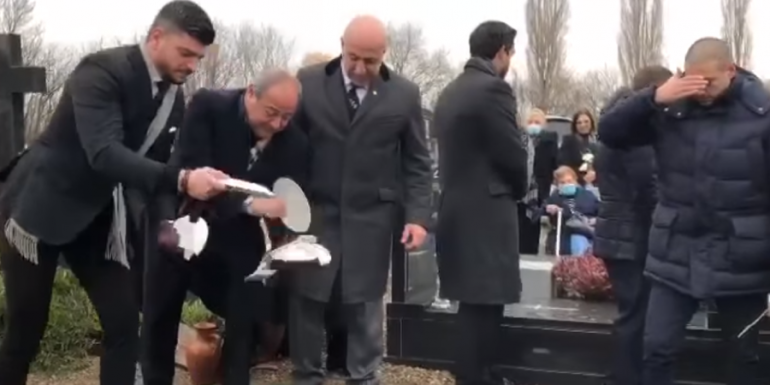The last farewell to the Cypriot George Karagiorgis was said in the way he would have liked: With song and breaking dishes.
The video was posted by Parikiaki:
It is recalled that George Karagiorgis, a Cypriot from Lefkonikos, the eldest of the Karagiorgis brothers, who are the owners of the famous Elysee restaurant in London, passed away at the age of 92. Tziortzis, the "Zorbas" of Lefkonikos, left his last breath on Christmas day.
The tireless creator and fiery "soul" of the legendary "Elysee". The "temple" of Greek quality gastronomy and especially the spooky live entertainment. The ultimate symbol of extravagance and revelry, which for more than 60 years continues to write fascinating pages of authentic entertainment in central London. For decades it remains perhaps the most famous store in the Greek and Cypriot community of London. In a classic three-storey British building with a terrace at 13 Percy Street in Fitzroy, the Greek restaurant has left an era as the most subversive and beloved bouzouki nightclub in the usually hazy English capital.
Not a night went by that George Karagiorgis did not dance, balancing glasses on his head, arousing his clients with his elaborate acrobatic tricks.
At the "Elysee" in Fitzroy, doom was allowed until the final fall. There were nights when the brand of the store, the singer Haris Galanos with the nickname "Marquis de Sant of the night", stepped on the broken pieces, leaning with one hand on the ceiling for balance. And from below they were delirious about the potpourri of the souks he sang, students who wore overalls, correspondents of the Greek press with cheap full-length jackets, make-up models with chignon backless toilets and well-dressed younger members of the ship families. Chians, Andriots, Oinoussians, Cypriots, Goulandrides, Empirikos, Tsakos, Porphyratos, Polemides, Fafalios, Laimoi, Chatziioannou and other representatives of the Greek shipping community of the City in London, the volcanic stage. The shop with tsiftetelozeibekika had crazy nights, depending on the course of Andreas Papandreou's health at the time when the then prime minister was hospitalized in Herfield.
The slogan of the store was "break what you want, as long as you pay for it". One night, in Chakir Kefi, the well-educated and wealthy spectators had broken the big mirror behind the orchestra. After that, the store added a special tariff to the list: "Mirror breaking: so many pounds", "Chandelier break: so many pounds", "Wall demolition: so many pounds". When money comes first, all the doors open, wrote domestic playwright William Shakespeare. In this case, in exchange for the payment of the appropriate price by sword-wielding newly rich people who lit their Cuban cigars by burning twenty saliva, even the doors become apocalyptic. "Break whatever you want," the singer said into the microphone, "you can also throw away your shoes, I know they are very expensive."
From Cyprus
George Karagiorgis was born in October 1929 in Lefkonikos, Famagusta province. His father was Kyriakos, a farmer and chair maker, known as Mastro-Tziatzis, and his mother Myrofora was of the Kamintzi family. As a freshman he was forced in his adolescence to leave High School to work on the estates and help the family that had to feed his four younger brothers, Michalis, Odysseus, Lida and Niki. He left Cyprus under colonial rule in 22 at the age of 1951 to travel to America via England at the invitation of his uncle Pierre Karagiorgis, who lived in Colorado, but the British did not grant him a visa and in August 1954 he returned to Megalonisos.
In his homeland, the Bakalouri family from the village of Oiko of Marathousa fell in love and married Maria the following July. With limited professional prospects in Cyprus, he returned to England as a newlywed with his wife. The couple settled in Cadiz Town in north-west London, just outside Camden, and got a job at London airport. The exhausting working hours, the long distance from his home and his desire to make something of his own hastened the realization of his professional dream.
Active, smart and charming in his approach to others, after thoroughly detecting the square, he turned for help - where else? - to his immigrant compatriots in the parish. He negotiated and agreed with the "Cyprus Brotherhood" to rent a part of the basement in its building, owned by the Archdiocese of Cyprus, in north London. He immediately ran to the "Pygmalion" printing house of the Spyropoulos brothers and printed 10.000 brochures in which under the title "Cyprus club" he included the menu - appetizers, beers and whiskey - at competitive prices. He sent them to all Greeks and Cypriots, as well as to all the Greek Orthodox churches in London. It was a pioneering move for the era, as it linked marketing to targeted advertising.
With information from First Issue
